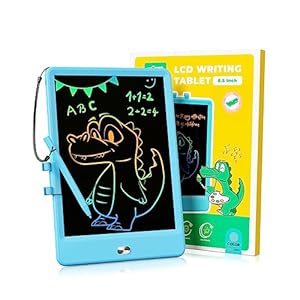
Now here’s something unprecedented from Mattel. No, not a prehistoric pseudosuchian most people have never heard of. Mattel likes those, and this is that too. What makes this one unique is that it represents an animal that lived during the Cenozoic. The era immediately following the Mesozoic and the one in which we’re currently living. Gryposuchus specifically lived in the Miocene, 16-5.3 million years ago. To the best of my knowledge every other animal Mattel has made for the Jurassic World line has been from the Mesozoic or earlier.


Gryposuchus was a species of gavialid crocodilian. Two species of gavialid are around today, the gharial (Gavialis gangeticus) and the false gharial (Tomistoma schlegelii). There are four species of Gryposuchus that have been described, the type species of which is G. jessei whose holotype was likely destroyed in Germany during WWII, but not in the same bombing that destroyed the Spinosaurus holotype. The species G. croizati is estimated to have measured 33.3’ (10.15 meters) or longer, which if accurate makes it one of the largest species of crocodilians known, larger even than Sarcosuchus. All Gryposuchus species come from South America where they were one of two freshwater adapted gryposuchines. Other gryposuchines lived in coastal environments.
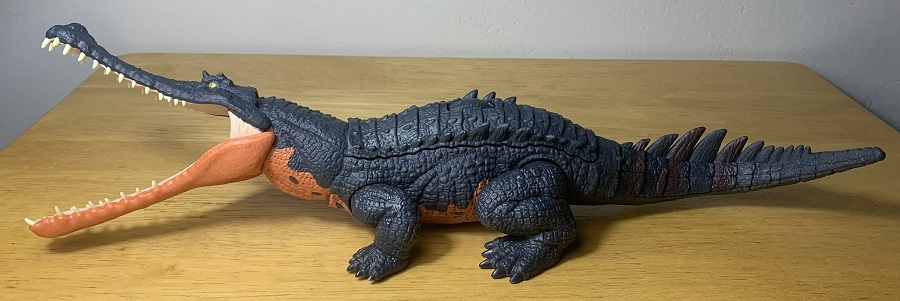
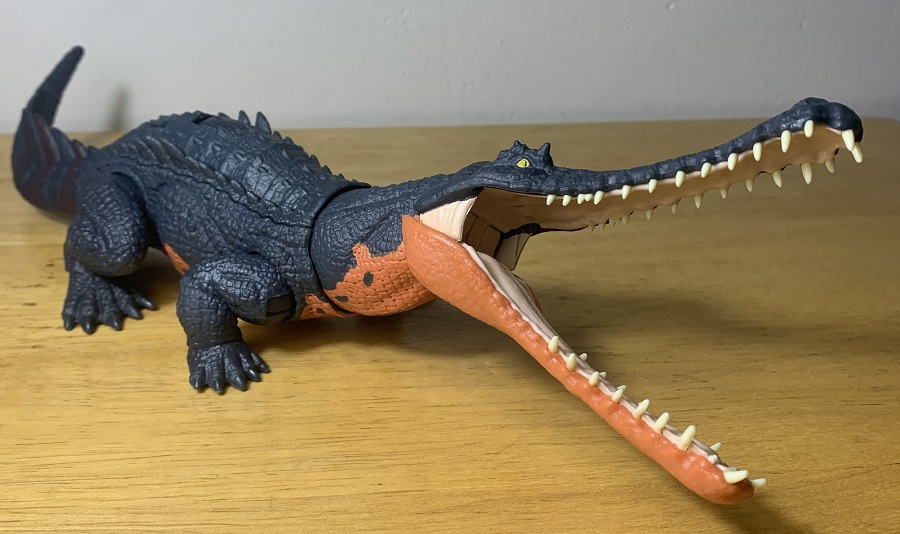
Gryposuchus might seem like another random name pulled from a hat by the folks over at Mattel, but it is featured in the mobile games Jurassic World: Alive and Jurassic World: The Game. The toy measures about 14.5” (36.83 cm) which if scaled down from the estimated 33.3’ length of G. croizati puts the toy at about 1/23 in scale.
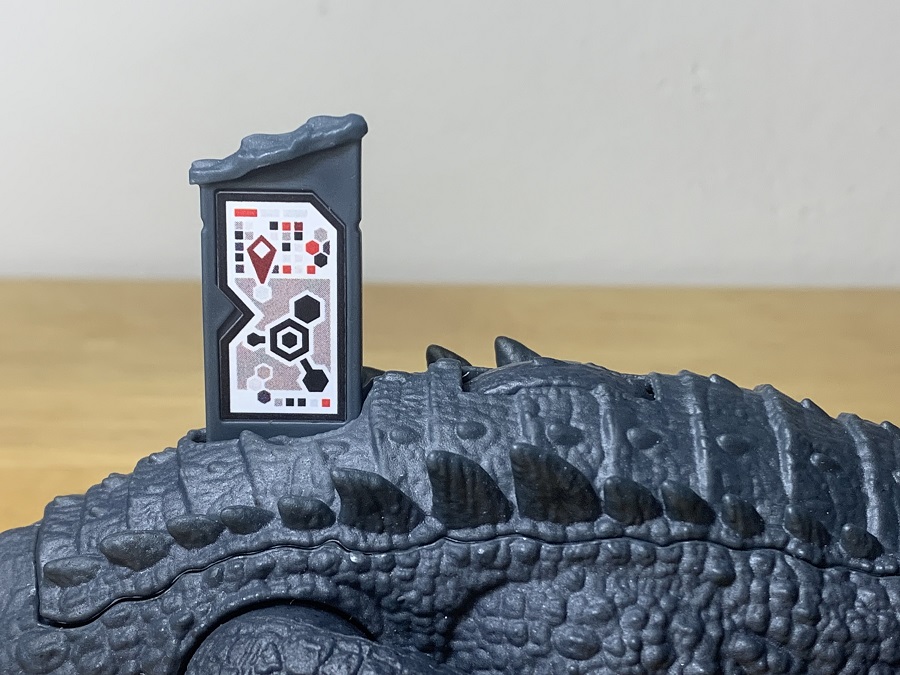
The toy has some basic articulation. The forearms can rotate completely around and swing in and out and the hindlimbs can rotate around. That’s about it and there’s not much you can do with it, not that a toy crocodilian needs much articulation anyway. A wheel on the back activates the action feature. The head swings left and right while the jaws open and close.
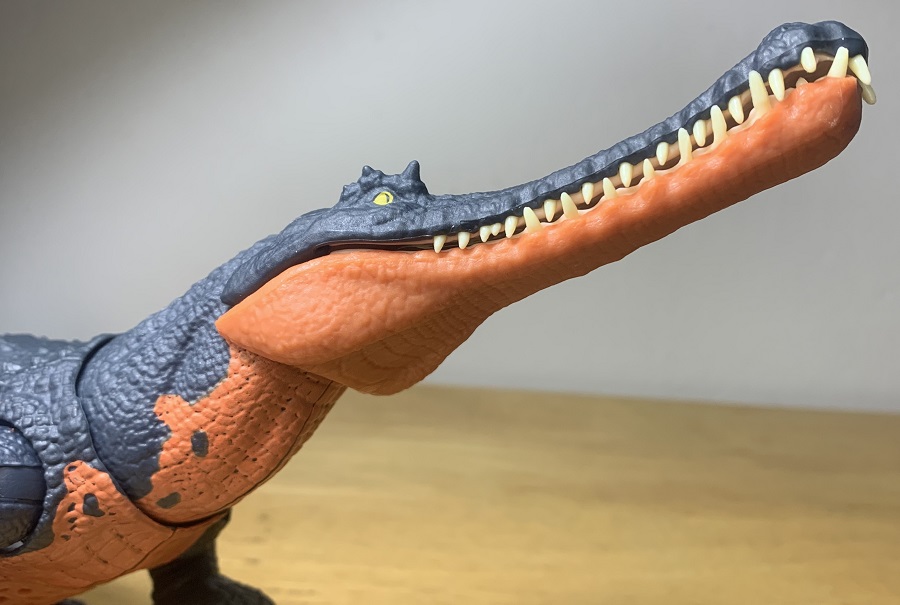
The toy also roars and hisses when the action feature is used but I would have preferred it if this aquatic animal was water-friendly, to allow kids to play with it in the tub or pool. The toy is posed with the head lifted and alert looking and with a slight bend in the tail, it looks very much like a crocodilian basking along the riverbank. Since the action feature relies on the continuous rotation of the wheel you can stop the wheel in various places and leave the toy with the mouth open and head tilted, giving you options for display.
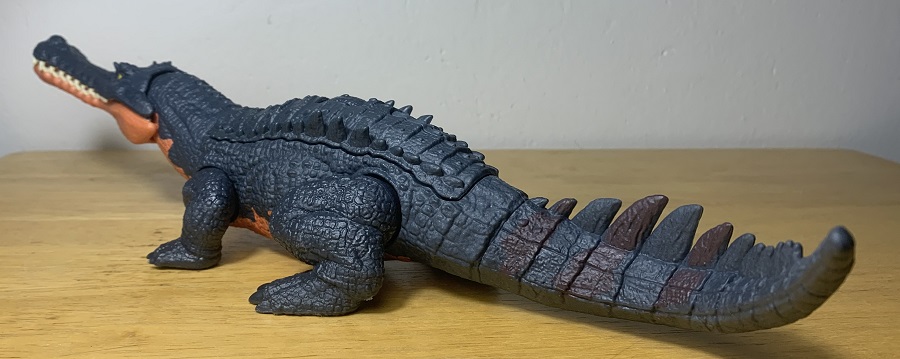
The head of the toy is rough in texture without any real discernable scales, but the underside of the jaw has plate-like scales that run down to and along the belly. The tip of the snout has a knobby growth like those on gharials. It could be a bit larger for added effect but it’s also acceptable the way it is. The snout is long and thin, and the head is an overall close match to that of Gryposuchus fossils. The inside of the mouth has a glossy finish with a nicely textured tongue and palate. The interlocking teeth are particularly noteworthy since they’re much finer than what we’re used to seeing in Mattel toys, greatly diminishing the cartoonish aesthetic these toys normally have. The teeth are also separate pieces from the jaw itself so there’s no issues with paint application. Although they look sharp, they are soft and rubbery, ideal for a kid’s toy. It’s some of the best dentition I’ve seen on one of these Jurassic World toys. Just compare it to something like the Sarcosuchus.
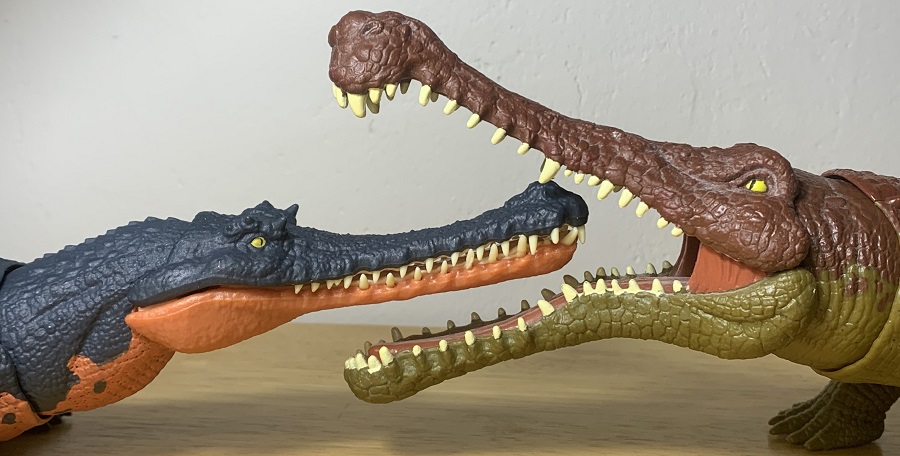
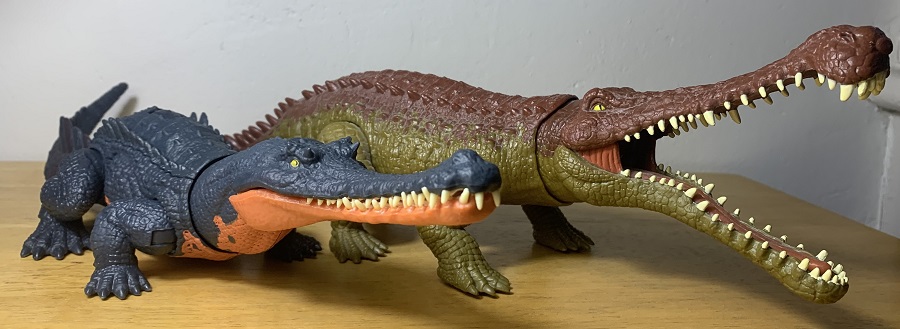

Some small spikes are sculpted around the orbits, adding a menacing aspect to the toy. Three rows of osteoderms on the neck transition to five on the back and then a single row on the tail. Those on the tail are exceptionally large and draw a lot of attention. The osteoderms are further detailed with faint grooves along the sides. The tail appears small proportionally and since it is packaged separately from the figure, I think Mattel could have made it larger.
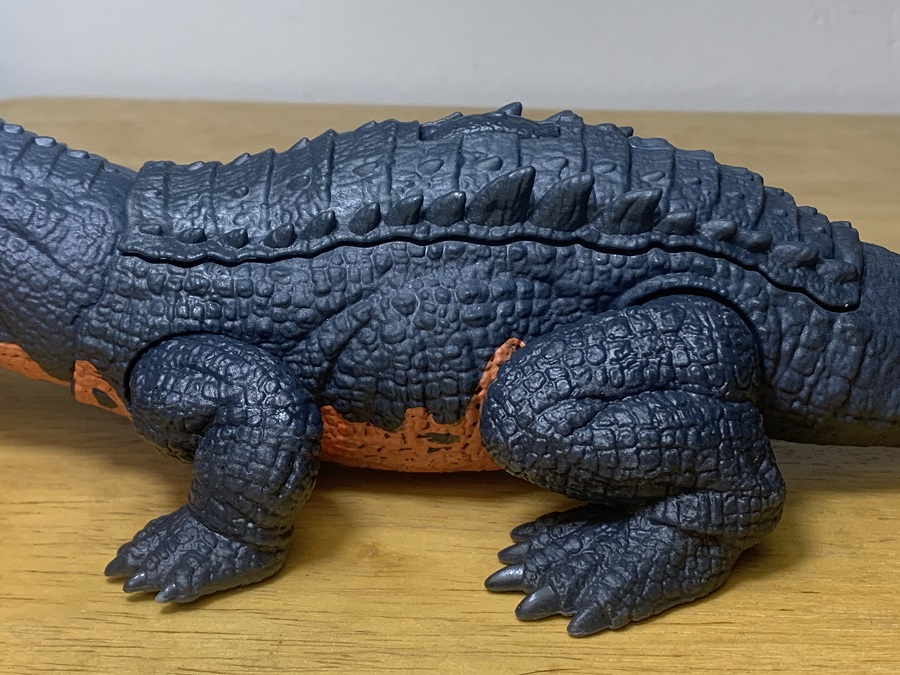
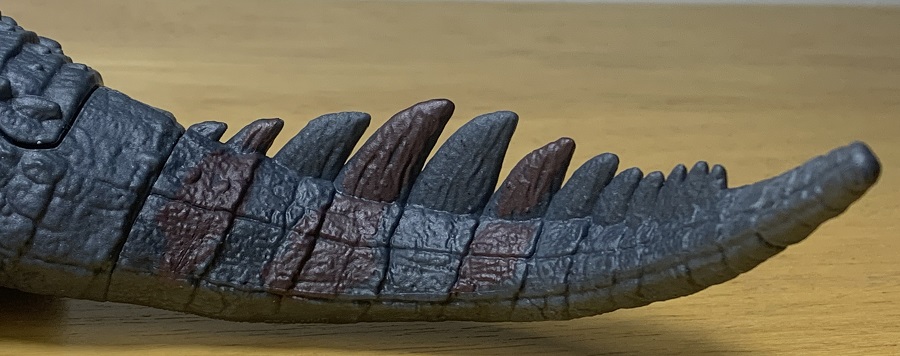
The rest of the body is detailed with small squarish shaped scales with larger feature scales scattered about. Five digits are present on each limb which is one toe too many on the hindfeet but whatever, they still look sufficiently crocodilian. The last two digits on the forelimbs should also be clawless. Creases and skin folds are added where appropriate, particularly where the limbs bend in on themselves.
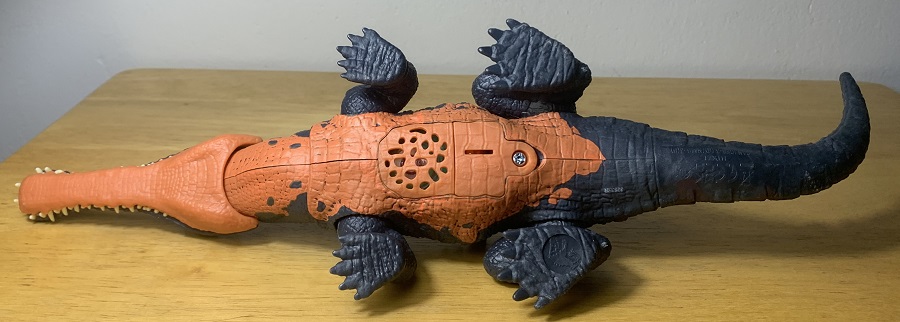
The toy is painted dark blue with a vivid neon orange lower jaw and belly with some dark blue spotting. That’s not it though! There are some faint dull purple bands on the tail which make the paintjob appear complete overall, a rarity for Mattel toys. The nails are not painted but their smooth texture contrasted against the rough texture of the feet gives the illusion that they might be. The inside of the mouth is faint pink, and the teeth are white. The eyes are yellow with slit pupils. The pupils are not painted but since the underlying blue color is so dark it doesn’t really matter. Overall, I find that the colors really pop on this toy, and I enjoy the contrast between the dark blue and neon orange.
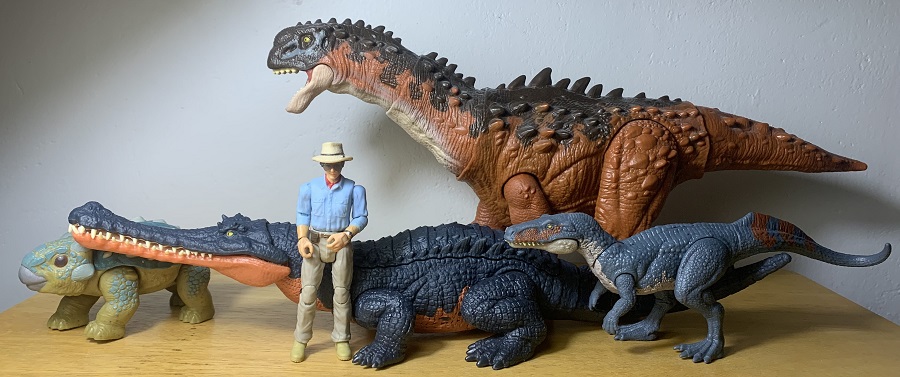
The Mattel Gryposuchus was one of the few must haves from this Epic Evolution wave. The refined teeth, less cartoony proportions, and vibrant paintjob, coupled with Mattel’s usual high level of detail, all come together to make this Mattel’s best pseudosuchian to date. This is the sort of toy that keeps me excited about the Jurassic World main line seven years after its launch. The Mattel Gryposuchus is currently available and retails for about $18.99. I don’t usually pay full price for these anymore, but I couldn’t pass up on this one, especially since it took so long to find it!
Support the Dinosaur Toy Blog by making dino-purchases through these links to Ebay and Amazon. Disclaimer: links to Ebay.com and Amazon.com on the The Dinosaur Toy Blog are often affiliate links, when you make purchases through these links we may make a commission
Trending Products



